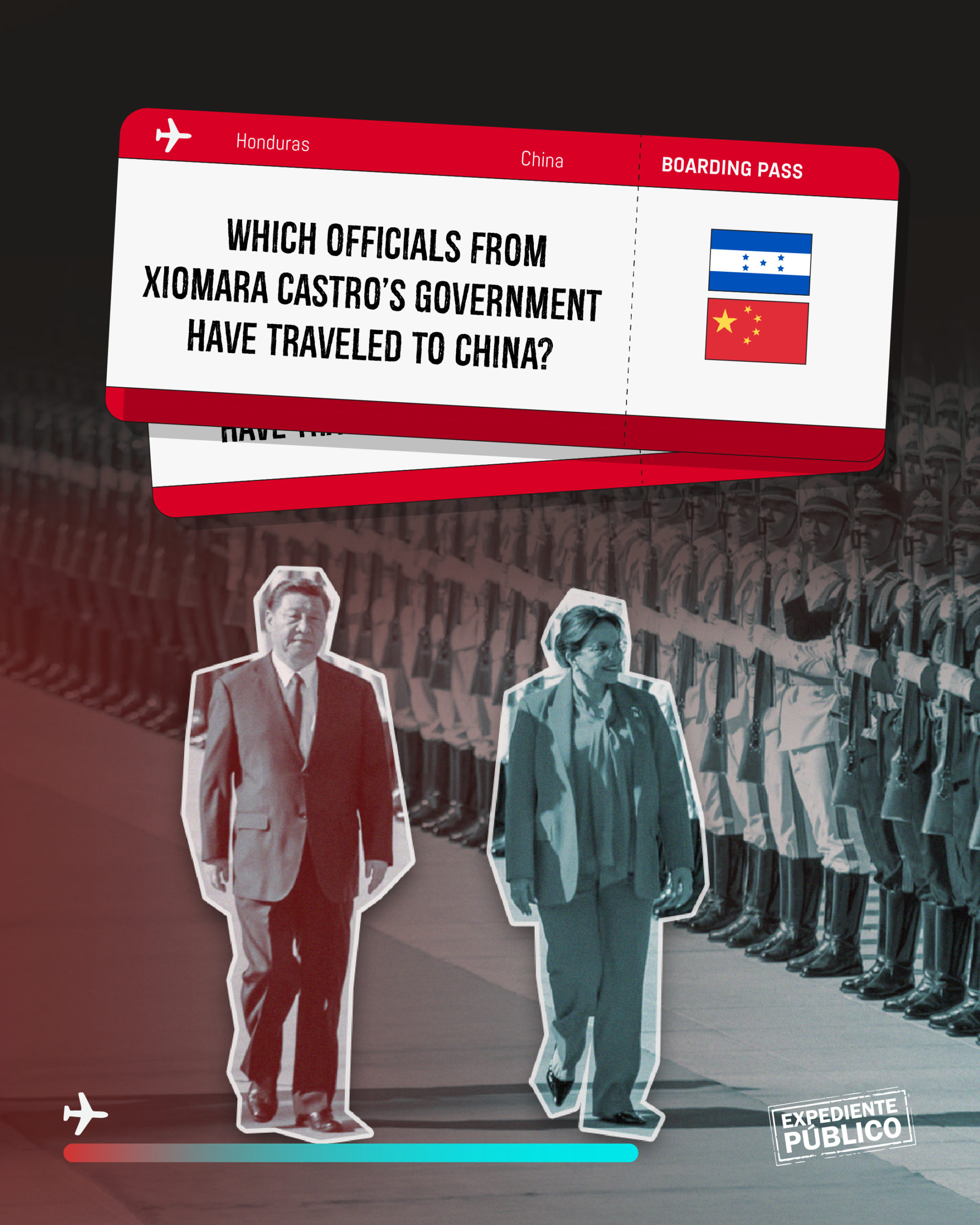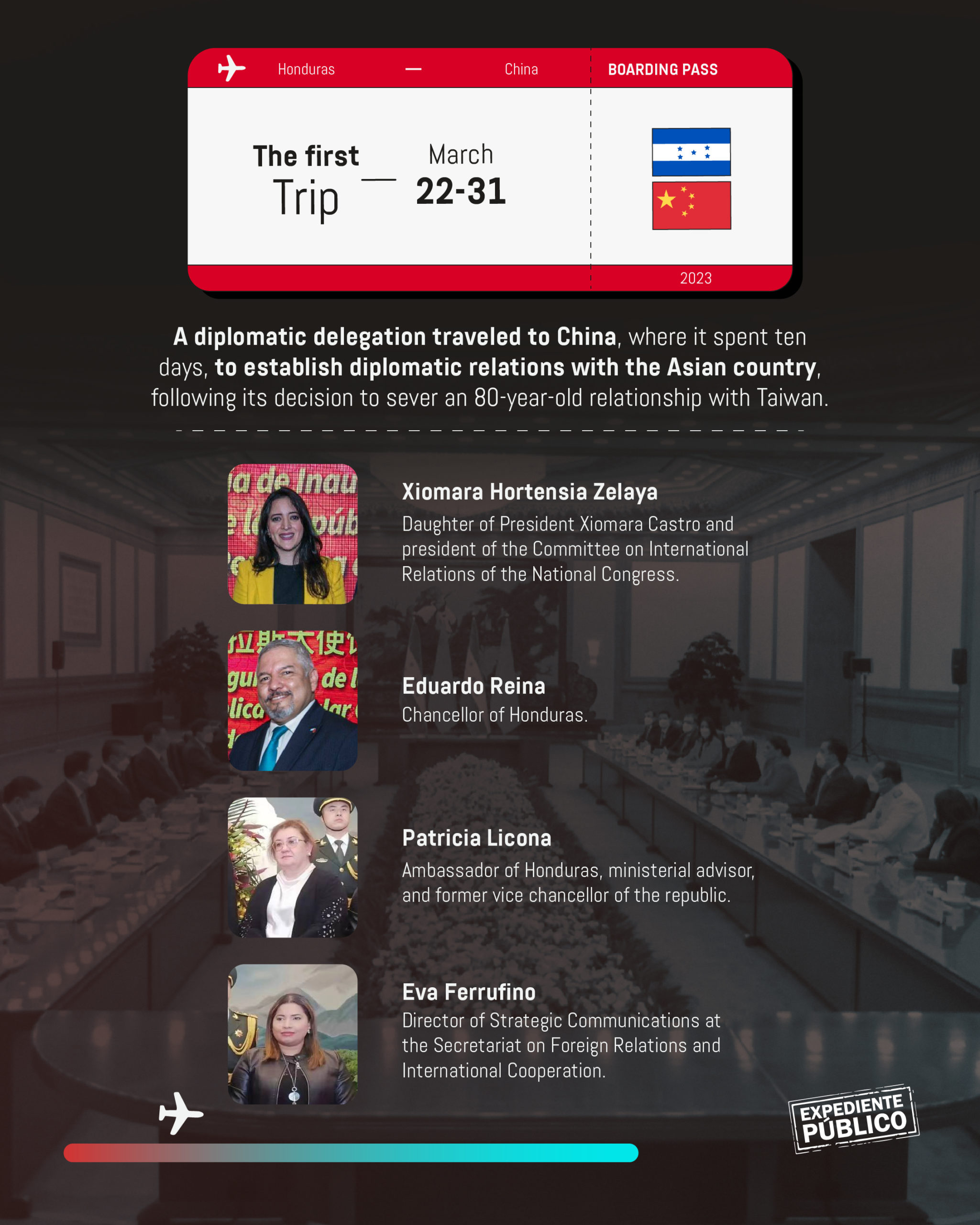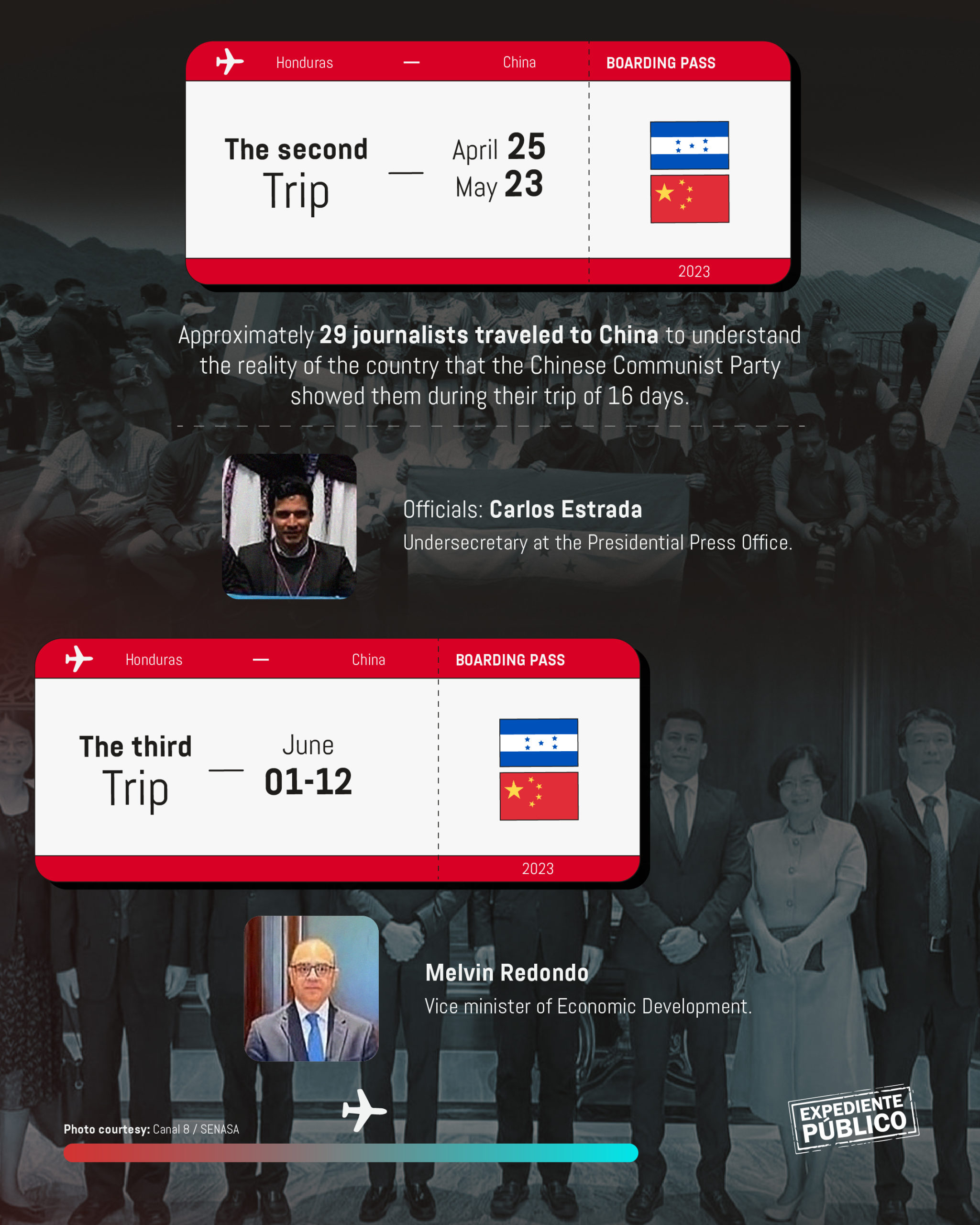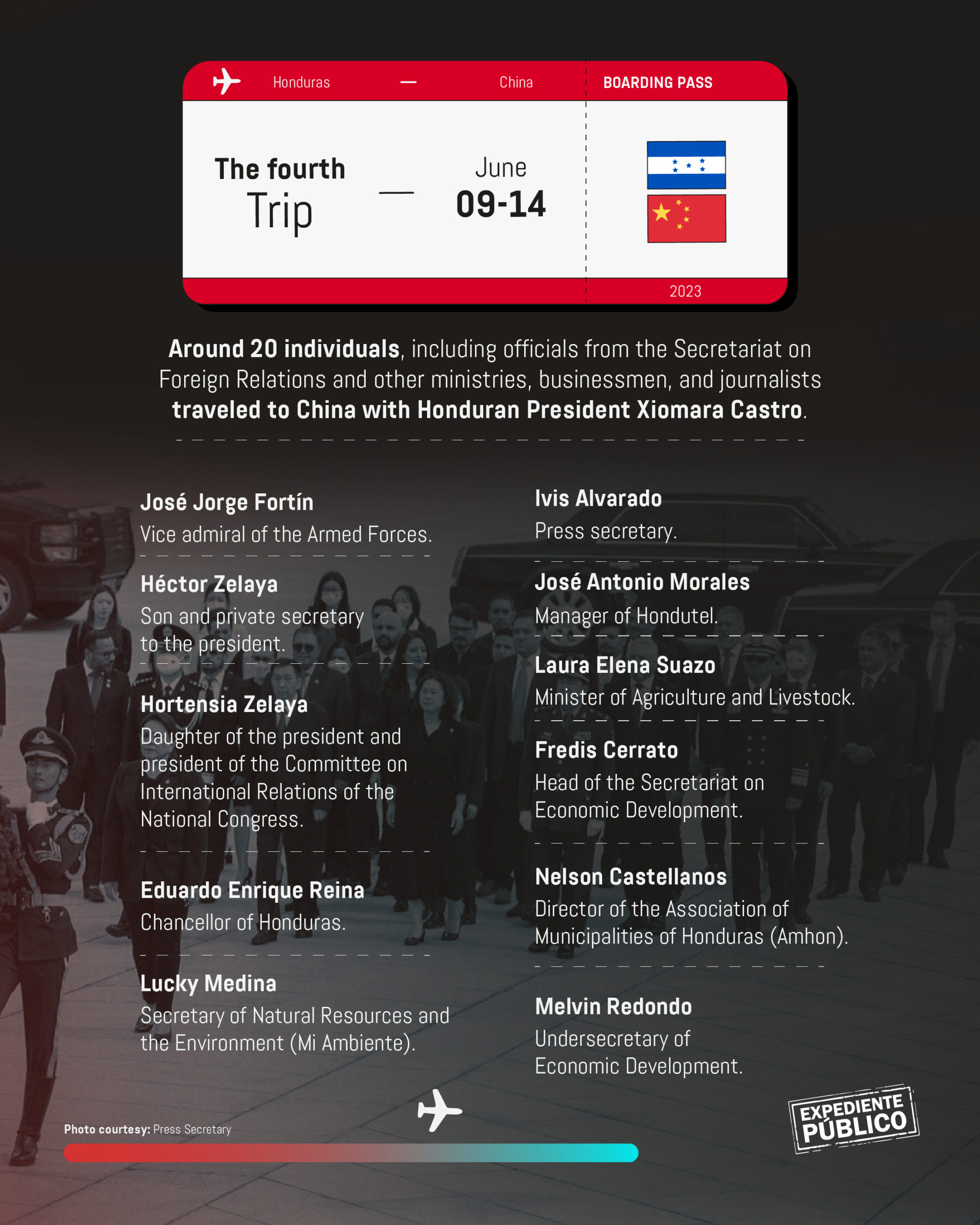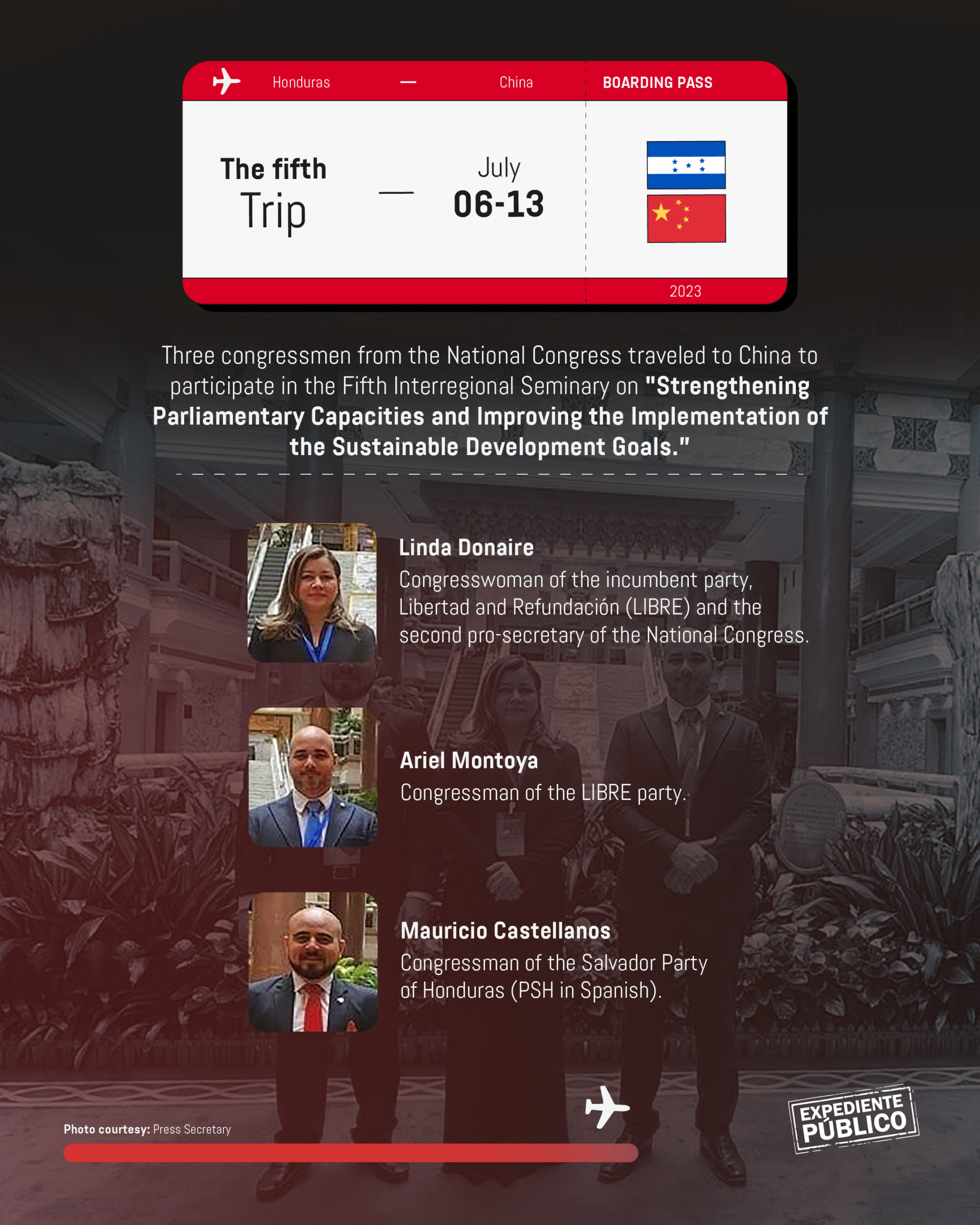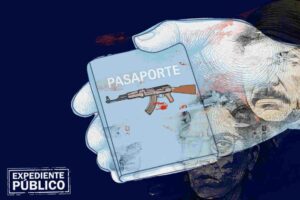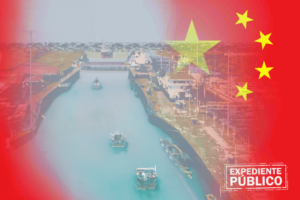*The government of Xiomara Castro refuses to respond to questions about how much China has spent on Honduran officials who were invited by the Chinese government. The government also keeps quiet about who is going on these trips and how much is spent on officials’ trips to other countries.
**Experts are of the opinion that it is normal in the field of diplomacy for a government to offer an all-inclusive trip to another government, provided that the invited official does not personally benefit from public contracts or in any other way.
Yarely Madrid / Expediente Público
A payment of up to ten days of travel, which was made by the People’s Republic of China to different Honduran officials raises questions about the extent to which these types of payments become conflicts of interest for the Honduran State, particularly regarding decisions that might not be very beneficial for the country but that the government makes due to a prior commitment or irregular movements by companies in China that are not reported in the contracts between the two countries.
A state paying for foreign dignitaries to visit is a practice in international relations, but for China, it is a strategic move that targets decision-makers in other countries who could be useful to the Chinese government in the future by supporting it in trade agreements, business, and diplomatic disputes.
Expediente Público verified, through public information request SOL-SRE-666-2023, made before the Secretariat of Foreign Relations (SRE in Spanish), that the expenditures from the first trip to China by the Honduran delegation, which ran from March 22-31 and established formal diplomatic relations between the two countries, were paid for by the Asian giant.
Xiomara Castro’s trip to Beijing (June 9-14, 2023), where she was joined by 19 other individuals, was paid for by China, according to statements from the president herself in the days prior to her leaving.
According to research by Expediente Público about China’s paying for 29 journalists to travel to the Asian country, the investigative media outlet estimated that airfare alone cost at least 132 thousand USD. In the last few months, there were also businessmen and three congressmen from the National Congress of Honduras: one from the Salvador Party of Honduras and two from the incumbent party, Libertad and Refundación (Libre).
On different occasions, Expediente Público contacted the director of Strategic Communication for the Secretariat of Foreign Relations and International Cooperation, Eva Ferrufino to coordinate an interview with the Honduran chancellor, Enrique Reina, who oversees Honduras-China relations for the country, to discuss these trips; however, there has been no response to date.
Read: Top Secret, así será la relación de Huawei con la Empresa Hondureña de Telecomunicaciones
What does the Code of Conduct say about these officials?
Honduras does not have a single law that regulates diplomatic trips. The only relevant legal document is the “Ethical Code of Conduct for Public Servants.”
Article 24 establishes that a public official “should not, directly or indirectly, request, accept, or admit money, dividends, benefits, gifts, valuables, favors, trips, travel expenses, pledges, or any other advantages, material or otherwise, from individuals or entities” to “unduly accelerate or delay tasks related to their diplomatic functions or to circumvent legal requirements, regulations, manuals, and instructions.”
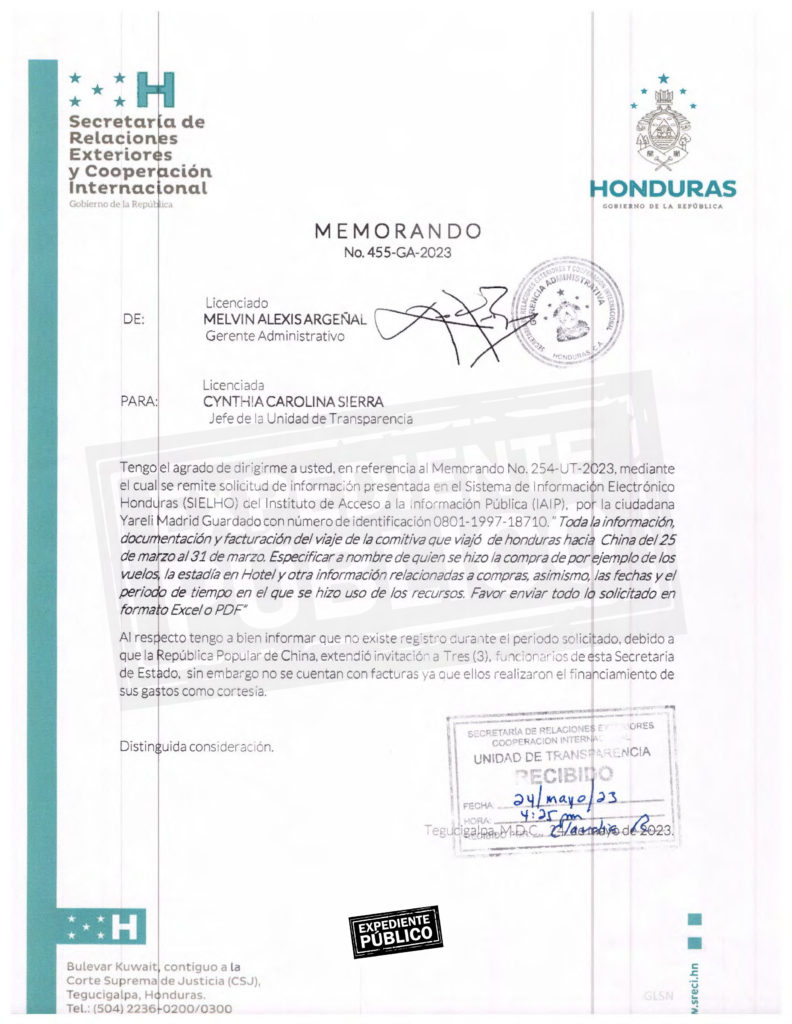
There’s no regulation
Graco Pérez, Honduran analyst in international law, told Expediente Público that the fact that travel expenses for public officials are not regulated equivalates to “a lack of transparency at the ministerial level.”
“There is no public information on the web pages of the secretariats of state regarding expenditures, particularly how much trips cost, where officials are staying, and how much hotel transfers to restaurants cost,” Pérez pointed out.
“There is no control over these issues because the pretext is that an official visit to another country is beneficial for Honduras, that it is necessary to seek help or relationships from other countries,” he said.
Read: Honduras, el nuevo botín del dragón chino en Centroamérica
Where is the line drawn?
Carlos Cascante, specialist in international relations and the history of Costa Rica, explained to Expediente Público that there is a “courtesy rule” that is part of international relations, in which each government should encourage relations with other countries.
In this sense, the “courtesy rule” refers to what is accepted internationally for trip expenses to another country, “provided that whoever carries out the trip is not being granted benefits by another government.”
“A review should take place following the trip and should look at the behavior of the official at hand, particularly whether if he or she is providing favors or privileges that do not correspond to the official. If this occurs, the official should be sanctioned,” said Cascante.
Even still, nothing is perfect, and there are always risks that the Chinese government maintains certain practices to buy favors through the investment agreements that it makes with other countries with which it has diplomatic relations.
In fact, for China, this is a normal practice that can be seen across Latin America with officials at the local, regional, and national levels.
“Many times, an official can react favorably toward a certain government that has invited him or her to visit the country; that is a fact. It is something that happens not only with China but also with the United States, with Israel, and with practically all the countries in the world that maintain these types of schemes,” he said.
What is different about China?
While diplomatic trips should not be demonized, the issue with China is that, as expert in Chinese affairs and editor of Chinese Analysis at the Center for the Economic Opening and Development of Latin America (CADAL), Juan Pablo Cardenal states in his work, The Art of Making Friends (“El arte de hacer amigos” in Spanish), friendships for the Chinese Communist Party (CCP) are always political and “significant in terms of strategic relationships, not personal and disinterested ones.”
Cardenal mentions that the CCP’s “strategy of soft power” is no more than the recruitment of elites in Latin American countries.
An important group for China is those who make decisions for the government, such as public servants. When China establishes who these people are, the CCP invites them to visit, covering all costs, reserving five-star hotels for the officials, and showing them the “majesty of the country.”
“What they try to do with these visits is reach a level of closeness with decision-makers to garner legitimacy, manage risks in a much more flexible context, encourage and bolster frameworks with cities in these countries, and prioritize Chinese friendship groups at the congressional level,” said the interviewee.
The expert underscored that the common practice for the Latin American political class is to see a relationship with Beijing as equivalating to potential opportunities.
Later, this relationship “inevitably translates into an almost complete absence of critiques [from Latin American governments] regarding the authoritarian nature of the regime in China, human rights violations [in China], and the kickbacks behind [Chinese] regional investment, conditions of China-backed loans, and the asymmetry of trade agreements [with China].”
Also of interest: Los acuerdos firmados por Xiomara Castro parecen un “cheque en blanco” a China
Does the US pay for foreign dignitaries to visit the country?
Expediente Público wanted to know if Xiomara Castro’s foreign policy relied on traveling to other countries through trips fully financed by other governments. In the case of the United States, a source in Honduras, who requested to be kept anonymous, responded that President Biden does not maintain this practice.
“We do not buy tickets for anyone who is not, for example, someone selected to participate in an exchange program. In the case of such a program, however, we make all the information public, announce from the beginning that all the trips will be fully financed by the government, and those that participate in these exchanges are members of civil society or journalists,” the source clarified.
“We are not buying President Castro tickets so that she can travel to the US. In fact, I believe that when she travels to the United States, she flies commercial. There are plenty of public officials (from the US embassy) that have traveled on American Airlines flights leaving Palmerola and have been on the same flight as the president by pure coincidence,” he continued.
Read: El “gran hermano chino” controlará las comunicaciones en Honduras
A lack of transparency
Expediente Público, through request SOL-PRSD-404-2023, solicited information from the President of the Republic (the White House) regarding the head of state’s travels to other countries like the United States, Colombia, Brazil, Argentina, and Italy, to have knowledge of the total cost of such visits.
There was also no response on behalf of Honduran authorities following a request before the Institute for Access to Public Information (IAIP), a tool of revision, according to Article 26 of the Law on Transparency and Access to Public Information.
Graco Pérez is of the belief that Honduran citizens should have knowledge of what is being spent on diplomatic visits, mainly because when there is a lack of transparency, “there is corruption.”
“There are different institutions like the Supreme Court of Auditors (TSE), the National Council on Corruption (CAN), and the Institute for Access to Public Information (IAIP), which should guarantee that every citizen has access to this information,” he stated.
The obligation to make the use of public funds transparent
Carlos Cascante is also of the opinion that “in an ideal system of governance that is democratic and transparent, all government funds should be public information, except when dealing with sensitive matters of national security.”
“When a president travels on official mission to another country, and everyone knows about the trip, democratic transparency has to exist so that any person interested in the matter can understand how that money was spent, who traveled with the president and what their expenditures were, and the results of the trip,” Cascante pointed out.


